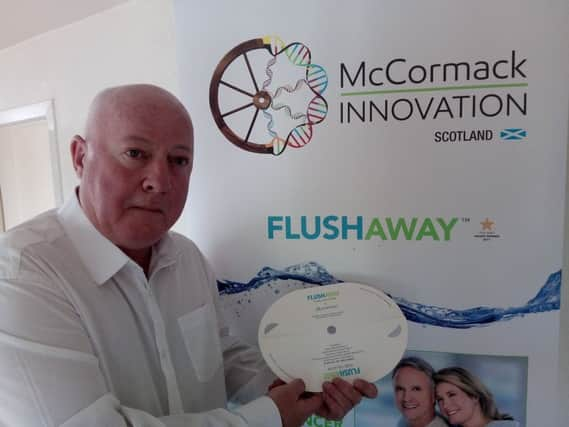Scots inventor aims to improve cancer screening with FlushAway device


Brian McCormack has pioneered a disposable device which presents a quick, clean, and dignified way to take samples for bowel cancer testing.
Now his business is branching out by testing other potential products such as completely soluble cotton buds, wound dressings and baby wipes, in a bid to reduce the millions of household products routinely disposed of in toilets.
Advertisement
Hide AdAdvertisement
Hide AdThe latest developments could not be more timely, with the Scottish Government currently seeking views on its plan to ban plastic-stemmed cotton buds.
Environment secretary Roseanna Cunningham has said outlawing the manufacture and sale of the items in Scotland would help cut plastic pollution.
Brian already has a track record in thinking outside of the box. His stool sample kit made headlines last year for its clean and simple solution to a very serious issue.
His unlikely path to inventor started at the Castlebridge colliery at Longannet, one of Scotland’s last deep mines, where he worked until 2001. He was working as a taxi driver when he came up with the idea for his first device.
The NHS offers bowel cancer screening tests to all men and women aged from 50-74 in Scotland, with half a million people taking part each year.
But Brian, from Kirkcaldy, believes that number could be higher if the process was made simpler.
“I came to the age that I had to do the test myself,” he told The Scotsman. “My own dad survived bowel cancer, and I saw the pain he went through, so I was very aware of how serious a condition it is.
“The NHS instructions for collecting stool samples can put some people off. They suggest getting a sample from the toilet by using either a food container or your hand.”
Advertisement
Hide AdAdvertisement
Hide AdBrian’s idea was to create the FlushAway, a patented device designed to be used once before being disposed off. Being fully dissolvable, there’s no threat to the environment.
It’s made from a type of paper previously used by submariners to carry secret orders. If their boat sank, the water would destroy the documents before they could be recovered by enemy forces.
He continued: “With early detection, nine out of ten lives can be saved but, with present screening programmes, detection rates are determined by the low return rates.
“We identified that the main reason for these low returns is the non-existent method of stool sample collection, so we then embarked upon the development of a stool collection device.
“The resultant product is a totally unique device, the safety and convenience of which will immediately raise return rates and reduce hospital infections. Used in hospitals, or sold for home use, this stool collection method will greatly reduce the risk of cross contamination and resultant infections.”
Brian has held preliminary talks with the Scottish Health Technology Group, which assesses all new technologies used by the NHS, and hopes to see his invention one day used in hospital wards as well as replacing the current cancer screening packs sent to households across the country.
He is also being mentored by Scottish Development International with a view to increasing his firm’s commercial venture.
His firm, McCormack Innovation, last week made it to the final of Scottish EDGE, a competition which offers the country’s most innovative start-up businesses finance and support.